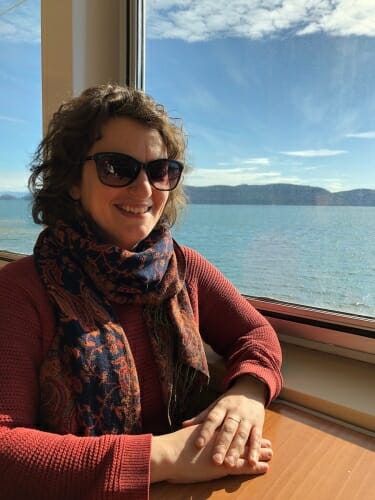Morgridge fellow Jennifer Seelig focuses on rural schools’ place in community
During her time as a high school Spanish teacher, Jennifer Seelig wondered how the community’s relationship with the school affects learning and instruction.
That was the topic she chose for her dissertation on rural schools, after she’d returned to school to get a PhD from UW–Madison’s Education Policy Studies program within the School of Education.
In hopes of writing an ethnography, she packed up and moved to a small town in Price County, Wisconsin where she would live and work for the next year. She was welcomed into a community, and she was able to get to know the people who her research would affect.
“My project was really looking at the relationship between the school and the community and how the larger macrostructures of economics, politics and social and cultural values all impacted that relationship,” Seelig said.
Seelig received the 2018 Rural Education Dissertation of the Year Award from the American Educational Research Association’s rural education special interest group (SIG) for “North of Highway 8: An Ethnographic Study of a School-community Relationship in Rural Wisconsin.”
Seelig, now the Assistant Director for the Rural Education Research and Implementation Center at the Wisconsin Center for Educational Research, has been selected as a member of the second cohort of Morgridge Fellows.
In her research, she examined community values and how they affected the school. For example, being close to nature and enjoying hunting and fishing were important to community members and therefore to the school district.
“The school has its own forest property and many classes would bring students there to engage with science that connected to the region’s identity as a former logging community. The school also adjusted their calendar so that students could join family members on hunting trips for the opening of the season. The high school also offered non-traditional courses in Field Science and Forestry. In addition, they partnered with the local city council to do a project on the town’s tree population,” Seelig said.
After graduating, she moved to Evanston, Illinois, for a year to do another study, at Northwestern University. This time, her study was not rural but instead on six different school systems and how they understand the relationship between their school system organization and instructional improvement.
Seelig was excited to come back to Wisconsin, where she could re-engage with the communities and schools around the state she knew. This came from her sense that her existing relationships could be deepened in ways that would positively impact rural education research.
Throughout her work, she has felt strongly about the idea that her research should be applied to those rural communities it studied, to benefit them.
“To me, what is important is connecting with folks before starting a project and starting from the ground up so that the research is something communities are involved in and want to apply,” Seelig said.
Seelig found that her research’s focus on community-engaged work aligned directly with the Morgridge Center’s values. She started to volunteer with the center, and the natural next step was applying to the fellowship program.
The program’s interdisciplinary nature appealed to her.
“I know the education world and I understand school and community relationships, but community-engagement is defined differently in other disciplines across campus. I am really excited about being with people from the medical campus as a way to learn and develop cross-campus connections,” Seelig said.
She looks forward to learning more about community-engagement ideas, which could apply to her current project concerning teacher retention in rural schools.
Seelig and her colleagues will begin the fellowship program in the fall. The fellows were selected through a juried process to participate in the year-long learning community designed to further institutionalize and support community-engaged scholarship, defined as: teaching, research, and scholarly activities that are performed in equitable, mutually beneficial collaboration with communities to fulfill campus and community objectives. The program is led by Morgridge Center academic staff and guest speakers from campus and community perspectives.

